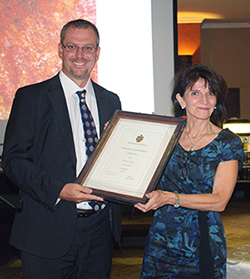Latest News Archive
Please select Category, Year, and then Month to display items
12 January 2024
|
Story Nonsindiswe Qwabe
|
Photo Sonia Small
 Since joining the UFS in 2008, Dr Grey Magaiza has worked extensively on approaches that can foster the socio-economic transformation of societies.
Since joining the UFS in 2008, Dr Grey Magaiza has worked extensively on approaches that can foster the socio-economic transformation of societies.
“The future should be one where communities can decide on their development agenda and futures. That’s the most important for me.” Dr Grey Magaiza, Deputy Director of the Centre for Gender and Africa Studies (CGAS) and Head of the Community Development programme on the Qwaqwa Campus, is passionate about capacitating communities to be agents of change and advancement. His vision for the future emphasises the empowerment of communities to take charge of their development by actively participating in decision making and the implementation of development projects that can improve their lives.
Since joining the UFS in 2008, Dr Magaiza has worked extensively on approaches that can foster the socio-economic transformation of societies. Over the years, he has crafted his research speciality into one that he is most proud of – being an interdisciplinary scientist immersed in the development of communities.
“I’m in a fortunate position of researching what I like. I say ‘fortunate’, because I’ve taken the time to understand what I’m passionate about, which is the overall field of rural livelihoods and livelihood futures – in short, community development. My research starts from an engaged university, understanding the elements that a university must use to enhance transformation and relevance to its immediate community in terms of development.”
One of the ways he has done this is by looking at social entrepreneurship as a development approach for young people in a rural setting. Through workshops with non-profit and civic organisations in Qwaqwa, Dr Magaiza has been helping these organisations to map out their needs and actively meet them through the involvement and support of external role players.
“We understand that communities are part of the national development agenda, but even that national agenda respects community knowledge and intentions and allows communities to shape their identity. A critical enabler of this is community organising. You bring back the capacity in communities to have dialogues on issues affecting them as spaces for engagement, knowledge exchange, and for people to just talk about their way forward.”
By enabling communities to define their development agenda, they can address their specific needs, challenges, and aspirations, he said. “When I look at livelihood futures, it’s quite an exciting aspect of my work – it’s like looking into a fortune tellers’ globe, because you’re not deciding for communities what they should do, but the communities themselves take those decisions.”
Penny Siopis recipient of the prestigious Helgaard Steyn Award
2015-12-15

Vanya Terblance (ABSA Trust representative) hands over the award to Penny Siopis
Photo: Valentino Ndaba |
On Friday 4 December 2015, Penny Siopis, the well-known Cape Town-based artist, who has been exhibiting her work locally and internationally since 1975, was presented with the 2015 Helgaard Steyn Award and a prize of R 550 000 for her painting entitled Swarm.
A quadrennial award lunch was hosted by the University of the Free State (UFS) Johannes Stegman Gallery in conjunction with the Helgaard Steyn and ABSA Trusts. The Helgaard Steyn Trust was established by the estate of Dr Jan Steyn and was named after his father and his brother who was the last president of the Orange Free State Republic.
Swarm, a 2011 painting using ink and glue on canvas, depicts a swarm of bees in a complex, dynamic, and intense manner. It earned the prestigious award that is dedicated to the promotion of artistic culture based on the adjudicators’ unanimous decision. Angela de Jesus, curator of the Johannes Stegmann Art Gallery at the UFS, Annali Dempsey of the University of Johannesburg Gallery, and Prof John Botha, Associate Professor in Art History at North West University, made up the 2015 panel of judges.
On receiving the award, Siopis thanked the Steyn family, the judges, and the people who nominated her. “I am struck by how fantastic it feels to be acknowledged. It is extraordinary when people are struck by what was your own world and the intensity buzzing in your head.”
According to Prof Botha, “Naturally the work of art is chosen on grounds of artistic merit and in the context of contemporary values with regards to both form and content.”
The award-winning painter studied Fine Arts at Rhodes University and Portsmouth University in United Kingdom. Apart from lecturing Fine Arts at the University of the Witwatersrand, she is an honorary professor at University of Cape Town Michaelis School of Fine Art. She has also taught at the Natal Technicon in Durban.
Siopis has received numerous awards for her work, including a British Council Scholarship, a Merit Award at the 2nd Cape Town Triennial, and the Atelier Award for a residency at the Cité Internationale des Arts in Paris, in addition to the Alexander S Onassis fellowship for research in Greece.